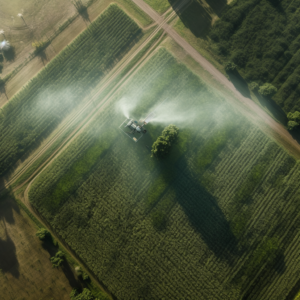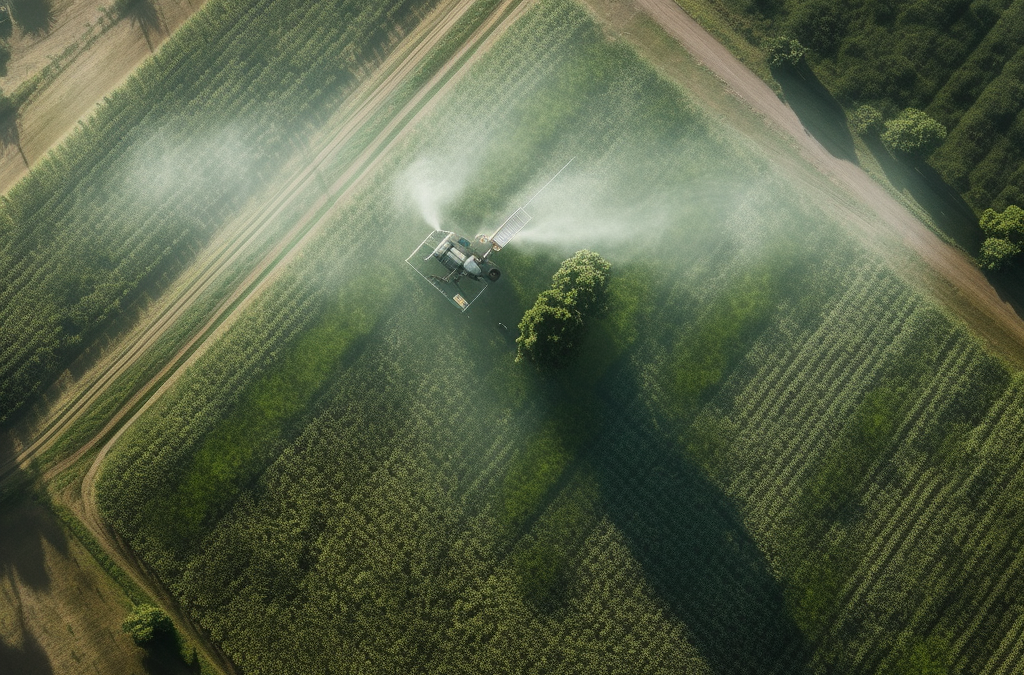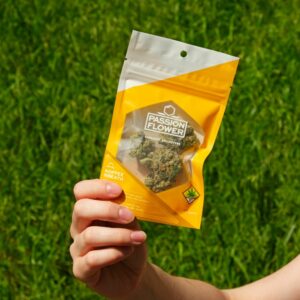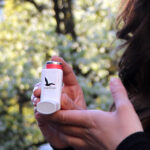Table of Contents
- Understanding the Use of Pesticides in Cannabis Cultivation
- The Regulation of Pesticides in Washington Cannabis Production
- The Fear and Reality of Pesticides in Cannabis
- The Dark Side: Pesticide Contamination in Washington State’s Cannabis Production
- A Safer Path: Pesticide-Free Cannabis Production
- Conclusion: Navigating the Complex World of Cannabis and Pesticides

A crop duster in action, applying pesticides over a cannabis field to protect against pests and diseases
Understanding the Use of Pesticides in Cannabis Cultivation
Have you ever stopped to think about whether the cannabis you’re ingesting possesses other chemicals that you never signed up for? Well, unfortunately it’s a scary reality we’re all living in. For many companies, pesticides play a major role in how they cultivate their cannabis. Most commercial cannabis producers use harmful pesticides to protect the plants from pests and diseases. While this ensures a healthy and abundant crop… Is there anything else healthy about it?
The type of pesticides used, the amount that is applied, and their application methods can significantly impact not only the quality of the final product, but the health of its consumer as well. Commonly used pesticides include neem oil, sulfur, and Bacillus thuringiensis.
The Regulation of Pesticides in Washington Cannabis Production
In Washington specifically, the Washington State Liquor and Cannabis Board (LCB) keeps a close eye on Cannabis production. The LCB has specific rules and requirements in place so that they can control pesticide use in cannabis cultivation in order to protect consumer safety and the environment.
After a stint with unregulated pesticide use when marijuana was first legalized for Washington state, the LCB began requiring cannabis producers to follow the Washington State Department of Agriculture’s (WSDA) regulations regarding pesticide use. Currently, the WSDA regulates pesticides under the Washington Pesticide Control Act (Chapter 15.58 RCW). This act establishes that cannabis producers in Washington are only allowed to use pesticides that are registered and WSDA-approved. The WSDA actually keeps a list of approved pesticides called the “Allowed Pesticide List.” Producers must reference to and adhere to this list of approved pesticides very closely.
There is no wiggle-room for producers to use a pesticide not listed on the “Allowed Pesticide List.” That’s strictly off-limits. Producers found using unapproved pesticides may face major penalties such as: fines, suspension, or cancellation of their license. Additionally, the LCB requires cannabis producers to keep detailed records related to their pesticide use. Producers must maintain accurate records of the pesticides used, including product names, active ingredients, application dates, rates, and other relevant information. These records may be subject to inspection by the LCB or other regulatory agencies at any time.
To stay informed about the latest pesticide regulations in Washington, cannabis producers should regularly consult the LCB’s website, the WSDA’s website, or directly contact these agencies for updated information. Additionally, joining industry associations or seeking legal counsel knowledgeable about cannabis regulations can help ensure compliance with all applicable rules.
The Fear and Reality of Pesticides in Cannabis
Public perception of pesticide use in cannabis is often fraught with fear. This fear is not unfounded as the potential health risks associated with pesticide residues are a legitimate concern. Consumers are increasingly aware of what they put into their bodies. And it’s true, the thought of consuming cannabis products tainted with harmful pesticide residues can be alarming. It’s understood that regulated amounts of pesticides can protect cannabis crops from pests and diseases that can significantly reduce yield and quality. Furthermore, regulations are in place to ensure that pesticides are used in a manner that minimizes risk to consumers, but there is still a risk nonetheless.
Many consumers worry about the potential health risks associated with pesticide residues, ranging from immediate health effects such as skin and eye irritation, headaches, dizziness, and nausea, to long-term effects like cancer, neurological disorders, hormonal disruption, and reproductive health problems. The fear is heightened by the fact that cannabis is often consumed through inhalation. Inhalation specifically is a mode of ingestion that could potentially increase the risk of adverse health effects. These concerns are valid considering pesticides are widely considered a safe tool in cannabis cultivation when used responsibly.
The Dark Side: Pesticide Contamination in Washington State’s Cannabis Production
The issue of pesticide use becomes increasingly more concerning than it already is when we come across instances where the pesticide use is completely unregulated. In these unregulated environments, harmful pesticides are often used without restraint, posing significant risks to consumers and the environment. Awareness and education about these dangers are vital in promoting safe and responsible cannabis consumption.
In a recent update from Washington’s cannabis regulator, an issue of pesticide contamination in marijuana produced in the north-central area of the state was brought to our attention. This situation underscores the importance of stringent pesticide regulation and monitoring in cannabis production. The investigation began after random testing detected the chemical compound DDE, a byproduct of the now-banned pesticide DDT, in marijuana grown in the area. This region, once home to fruit orchards, houses eighteen cannabis licensees along a five-mile stretch of land along the south end of the Okanogan River and north of Lake Pateros.
Preliminary testing results of soil samples collected in April showed levels of DDE/DDT and lead and arsenic above state standards. Out of 124 samples of water, marijuana foliage, and marijuana oil and rosin from the area, 97 have been tested so far. Sixty-six of these samples showed detectable levels of DDE, and 44 had DDE concentrations above the action limit.
This case study serves as a stark reminder of the potential risks associated with pesticide use in cannabis production. It underscores the need for rigorous testing and regulation to ensure the safety of consumers and the environment. For more details on this case, you can refer to the full report. This real-world example further emphasizes the importance of the topics discussed in this article. As we move forward, it’s crucial to keep these lessons in mind and strive for safer, more sustainable practices in cannabis cultivation.
A Safer Path: Pesticide-Free Cannabis Production
Amid the concerns surrounding pesticide use, a growing movement advocates for pesticide-free cannabis production. By employing natural pest management strategies and rigorous cultivation practices, some producers have successfully grown cannabis without the use of pesticides. This approach not only ensures a safer product for consumers but also promotes a more sustainable cannabis industry. That’s where we come in.
It’s scary to hear that the cannabis we’ve been ingesting may possess harmful chemicals. It’s especially frustrating to hear that we may not be reaping all of the benefits that marijuana possesses due to the use of pesticides. Most consumers of cannabis that I personally know don’t seem to have any awareness about this issue at all which is even more concerning. So if this is the case, why use them? Is ensuring a larger crop (and therefore, more profit) really more important than ensuring the safety of our consumers?
At Passion Flower Cannabis Collective, the answer is simple: NO. Pesticides are gross! As marijuana becomes more widely legalized, it is up to the cannabis producers to be transparent about what they’re putting in their products. Moreso now than ever before, it is vital that consumers across the nation be protected by Cannabis companies rather than fooled by them. Marijuana and its cannabinoids possess so many perks from psychological benefits to assisting the treatment of physical pain and various ailments.
If you want to be sure that your cannabis is pesticide-free, please feel free to peruse our website for our available cannabis products. We have anything from pre-rolls and flower, to cartridges and of course, our esteemed Nectar Drops… and so much more! There are lots of options, I know, but we find that it’s important you can enjoy your preferred mode of getting elevated without worrying about toxic pesticides. Let that be our job.
Conclusion: Navigating the Complex World of Cannabis and Pesticides
Understanding the role of pesticides in cannabis production is no small feat. It requires a careful balance of knowledge, responsibility, and vigilance. As consumers, cultivators, and regulators, we must continue to educate ourselves and others about these complexities. Only then can we ensure the safe and sustainable future of the cannabis industry.
Your Friends at Passion Flower,

.
Frequently Asked Questions
- Q: Why are pesticides even used in cannabis cultivation in the first place?
- Many cannabis cultivators use pesticides to protect the plants from a variety of pests and diseases and ensure a larger yield full of healthy plants. To clarify, the plants are healthy… Not the products they produce that are full of chemicals!
- Q: What are the rules and regulations surrounding pesticide use in cannabis production?
- Regulations surrounding pesticide use in cannabis production vary widely across regions. For instance, in California, no pesticide product is federally registered for use on cannabis. However, certain pesticide products can be legally used on cannabis in the state of Washington. Be sure to check the Cannabis and agricultural laws of your own specific state if you have any questions or concerns.
- Q: What risks are associated with pesticide use in cannabis?
- Pesticide use can pose risks to consumers and the environment, especially when its use goes unregulated. This can cause harm to both the Earth. Not to mention, it may greatly impact consumer’s short-term and long-term health. While the use of pesticides can be safe with regulation, there is always a risk when ingesting cannabis that has been grown with pesticides. Does it really matter if the risk is “minimized?”
- Q: What is pesticide-free cannabis production?
- Pesticide-free cannabis production refers to the cultivation of cannabis without the use of pesticides. This is achieved by employing natural pest management strategies and rigorous cultivation practices.
- Q: How can we be sure the cannabis we are ingesting is safe?
- Understanding the role of pesticides in cannabis production is key. It requires a careful balance of knowledge, responsibility, and vigilance. As consumers, cultivators, and regulators, we must continue to educate ourselves and others about these complexities. But if you really don’t want to worry? Buy yourself some cannabis that is certified pesticide-free. Stay safe out there!
Sources
- Cannabis Business Times: Pesticide Use in Cannabis Cultivation: This source provides a comprehensive overview of pesticide use in cannabis cultivation, including the types of pesticides commonly used and their potential impacts on the quality of the final product.
- California Department of Pesticide Regulation: Legal Pesticide Use: This document provides detailed information on the regulations surrounding pesticide use in cannabis production in California. It explains how these regulations aim to ensure the safety of consumers and the environment.
- Leafly: Pesticides 101: This article discusses the public perception of pesticide use in cannabis and explains that when used correctly and in compliance with regulations, pesticides can be a safe and effective tool in cannabis cultivation.
- The Guardian: Pesticides in Illegal Cannabis: This article delves into the issue of pesticide use in illegal cannabis cultivation, highlighting the significant risks to consumers and the environment.
- Washington State Department of Agriculture: Pesticide Contamination in Cannabis: This source provides a case study of pesticide contamination in Washington State’s cannabis production, underscoring the importance of stringent pesticide regulation and monitoring.







